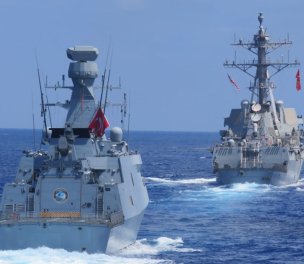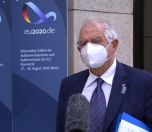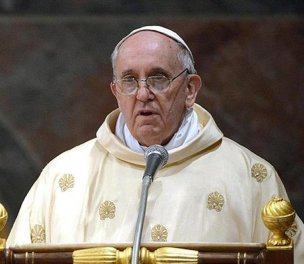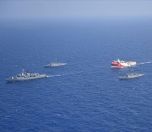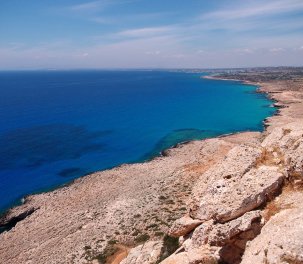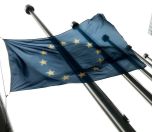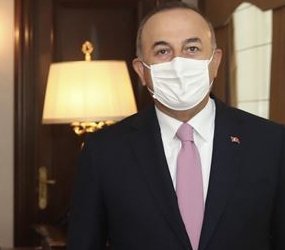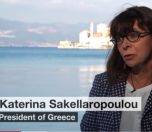Photo: AA
Click to read the article in Turkish (1) (2)
Turkey has again extended its energy exploration in the Eastern Mediterranean through its ship the Oruc Reis, this time by 11 days, until September 12.
It issued a Navtex (navigational alert) last night (August 31), announcing an extension of the ship's research activities accompanied by the Cengiz Han and Ataman vessels.
Earlier, Turkey had announced the ship's mission would continue through September 1.
Navtex is a maritime communications system that allows ships to inform other vessels about their presence in an area, as well as other information.
Hours later, Greece issued a Navtex from its Iraklio station on the island of Crete, Kathimerini reported.
"Turkey continues to faithfully live up to its role as a troublemaker and an element of instability in the region," the Greece's Foreign Ministry said in a statement. "Greece will not be blackmailed. Relying exclusively on international law, the Law of the Sea and the rules of good neighborly relations, it will continue to seek maritime zone delimitation agreements with every country in the region."
In early August, Turkey resumed energy exploration in the Eastern Mediterranean after Greece and Egypt signed a maritime delimitation deal.
Declaring the deal "null and void," Turkey authorized the Oruç Reis to continue its activities in an area within Turkey's claimed continental shelf.
Ankara has consistently opposed Greece's efforts to declare an exclusive economic zone based on its islands near Turkey's Mediterranean shores.
Erdoğan: We won't allow piracy
Turkey will not tolerate illegal actions in the Aegean and Mediterranean regions, President and Justice and Development Party (AKP) Chair Recep Tayyip Erdoğan said yesterday.
"Turkey won't allow piracy or banditry in the Mediterranean or Aegean regions," Erdoğan said in the Black Sea province of Giresun at an event marking the start of the fishing season.
He remarked, "As the Turkish nation, we do not violate others' rights, nor will we let them do so [...] We are determined to fully defend the maritime rights of our nation and the Turkish Cypriots."
Erdoğan said Turkey would not be confined to its shores, as it is the country with the longest coastline in the region.
He said the discovery of 320 billion cubic meters of natural gas in the Black Sea region "revealed the true potential" of Turkey, which is surrounded by rich energy resources, adding that this discovery heralded a much larger find.
"Our Oruç Reis determinedly maintains its seismic research activities; God willing, we hope to have good news in the Mediterranean as soon as possible, as we did in the Black Sea," he said.
France's "red line" statement
The Ministry of Foreign Affairs criticized a statement by President Emmanuel Macron of France about the tension in the Eastern Mediterranean.
"Those who think they drew a red line in the Eastern Mediterranean are challenging our country's resolute stance," it said in a statement.
On Friday (August 29), Macron said he had adopted a "red-line policy" in the region backing Greece against Turkey over the exploration of energy resources.
"If there is a red line in the region, it belongs to Turkey and the Turkish Cypriots based on international law," the ministry added.
"The period of determining their imperialist understanding by drawing lines on maps is over," the statement said, referring to France's colonial past.
"Turkey is powerful enough to deter anyone who attempts to seize its rights and interests by deploying an 'armada'," it said.
Maritime border claims of Turkey and GreeceTurkey signed a maritime border agreeement with Libya's Governmenf of National Accord (GNA) on November 27, 2019. Greece and Egypt signed a simillar agreement on August 7. |
Latest developments in the Eastern MediterraneanOn July 28, Turkey announced after Germany's diplomatic efforts that it suspended hydrocarbon exploration activities, in the Eastern Mediterranean, which had been underway since early 2019, and stated that it was ready to talk with Greece. On August 6, Greece and Egypt signed a maritime border agreement. On August 10, Turkey announced that its drillship Oruç Reis would resume energy exploration in the Eastern Mediterranean. It said the ship will continue its work along with the ships Cengiz Han and Ataman until August 23. On August 14, the EU foreign miniters discussed the crisis at an extraordinary meeting, calling on Turkey to end hydrocarbon exploration activities in contested waters. On August 16, Turkey issued a Navtex, announcing that its drill ship Yavuz will continue its work exploring for energy resources off the island of Cyprus. On August 23, Turkey issued another Navtex, stating that the Oruç Reis vessel would continue its activities until August 27. On August 24, Greece held joint naval drills with the US in the south of Crete island. One day later, Turkey conducted naval exercises with Italy. On August 25, Germany's Minister of Foreign Affairs Heiko Maas visited Athens and Ankara to encourage the two countires to have direct talks. On the same day, Turkey held replenishment exercises with Italy in the Eastern Mediterranean. On August 26, US President Donald Trump had phone talks with President Recep Tayyip Erdoğan and Prime Minister of Greece Kyriakos Mitsotakis, urging them to reduce tensions and start dialogue. On the same day, Turkey and the US conducted joint maritime exercises. On August 27 and 28, EU foreign ministers met with the Eastern Mediterranean crisis on the top of their agenda. The Union's foreign polict head Josep Borrell said after the meeting that Turkey's ships might be sanctioned if they continued hydrocarbon activities. Turkey's Ministry of National Defense on August 28 announced that it intercepted six F-16 fighters planes of Greece, which it said were closing in on the area where Turkey issued a Navtex. |
(EKN/VK)




.jpg)


-132.jpg)
